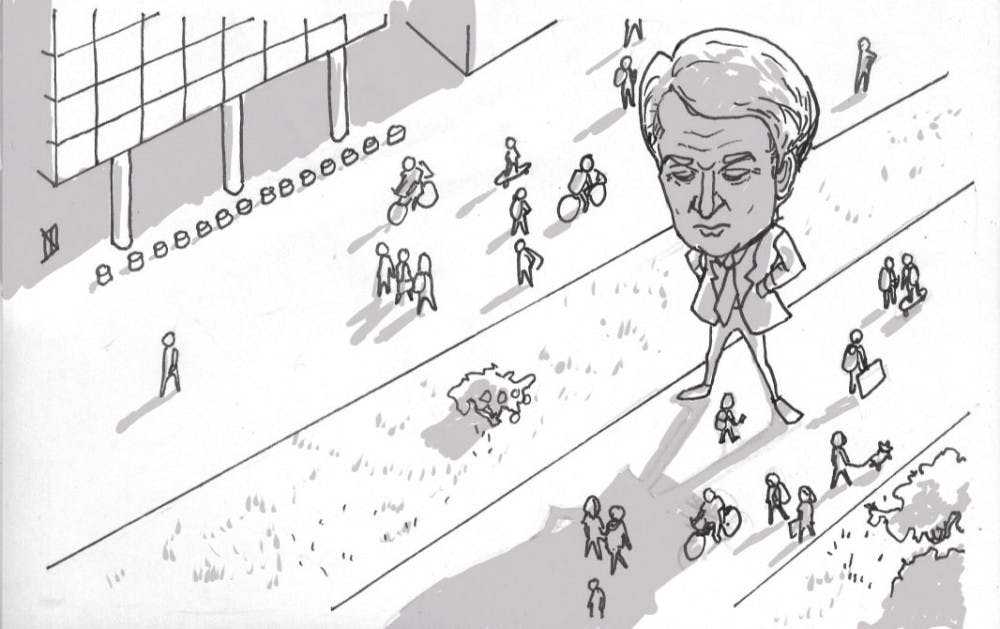On Oct. 6, Justice Brett Kavanaugh was confirmed to the U.S. Supreme Court after a nearly three-month-long confirmation battle that escalated as Kavanaugh was accused of multiple instances of sexual assault and general misconduct during his years in high school and college.
To many on campus — myself included — while the eventual decision to confirm Kavanaugh was not surprising, the process as well as its implications seemed to be a slap in the face to survivors of sexual assault nationwide.
The appointment of someone facing multiple accusations of sexual assault to our nation’s highest court — a position that, in many instances, can have greater influence on social issues than even the presidency — serves as a painful reminder of the progress yet to be made culturally.
Kavanaugh's confirmation has started a dialogue on how we punish mens' misbehavior, and men on ASU's campuses must understand their responsibility in the fight against campus sexual assault.
While the confirmation of any Supreme Court Justice would naturally have far-reaching consequences for the entire nation, the confirmation of a justice accused of sexual violence during his college years speaks to how society compartmentalizes the issue of campus sexual assault.
According to the Live Well @ ASU website, "4.0 percent of ASU female students and 0.9 percent of ASU male students reported they experienced an attempted or completed sexual assault in the previous year."
Julie Alvarez, the president and co-founder of the ASU chapter of Team One Love, said the confirmation of Kavanaugh speaks to our society’s compulsion to disregard the stories of abused women and excuse the bad behavior of men.
“I think it essentially sends the message that men won’t be held accountable for their actions,” Alvarez said. “It’s a very infuriating situation for those who have experienced sexual violence on campus.”
Ultimately for Alvarez, it's a matter of accountability.
“It would be one thing if he had admitted, ‘I was young, I was stupid, I regret that immensely and I never should have done that,’ but denying it is not acceptable,” Alvarez said.
Brett Kavanaugh said in a statement, “I categorically and unequivocally deny this allegation. I did not do this back in high school or at any time.”
This denial is not sufficient.
While there are plenty of organizations at ASU doing work to combat campus sexual assault, it is clear that men at ASU have an immense responsibility in this fight.
Men should be, “calling out rape culture and culture that excuses poor behavior,” Alvarez said. “They should be stepping up and focused on not just being bystanders.”
Putting aside the credibility issues related to Kavanaugh's documented past binge drinking, denials such as these are common tactics of abusive men.
Men have outsized power, both on campus and in society writ large and especially in our current political climate, it’s the responsibility of college men to use this power to support college women who are victims of sexual assault on and off ASU campuses.
College men must believe victims, mustn’t elevate abusers, and, hopefully, Congress and the Supreme Court will do the same
Related Stories:
ASU organizations support action against sexual assault during April
Opinion: Brett Kavanaugh will be detrimental to the ASU student body
Reach the columnist at cldoming@asu.edu and follow @chuck_dominguez on Twitter.
Editor’s note: The opinions presented in this column are the author’s and do not imply any endorsement from The State Press or its editors.
Want to join the conversation? Send an email to opiniondesk.statepress@gmail.com. Keep letters under 500 words and be sure to include your university affiliation. Anonymity will not be granted.
Like The State Press on Facebook and follow @statepress on Twitter.




